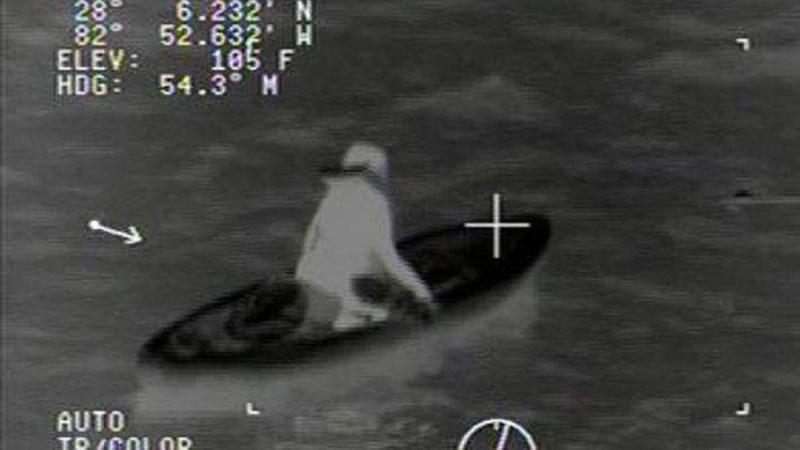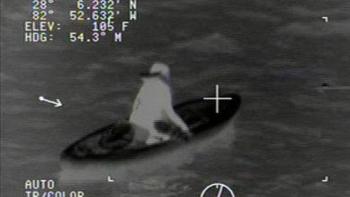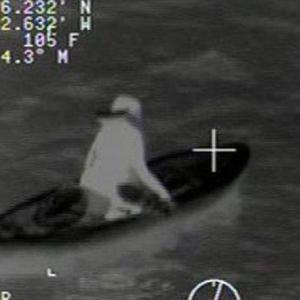Paddle Craft Safety Training June 8 and 9
 Gulf of Mexico West of Clearwater, FL, April 11, 2016, 10 p.m. local time: An infra-red still image taken from a Coast Guard helicopter video showing a 17-year-old girl being rescued after four hours adrift after she lost her paddle due to a boat wake and became separated from her companions, disoriented and hypothermic. US Coast Guard photo.
Gulf of Mexico West of Clearwater, FL, April 11, 2016, 10 p.m. local time: An infra-red still image taken from a Coast Guard helicopter video showing a 17-year-old girl being rescued after four hours adrift after she lost her paddle due to a boat wake and became separated from her companions, disoriented and hypothermic. US Coast Guard photo.

 Gulf of Mexico West of Clearwater, FL, April 11, 2016, 10 p.m. local time: An infra-red still image taken from a Coast Guard helicopter video showing a 17-year-old girl being rescued after four hours adrift after she lost her paddle due to a boat wake and became separated from her companions, disoriented and hypothermic. US Coast Guard photo.
Gulf of Mexico West of Clearwater, FL, April 11, 2016, 10 p.m. local time: An infra-red still image taken from a Coast Guard helicopter video showing a 17-year-old girl being rescued after four hours adrift after she lost her paddle due to a boat wake and became separated from her companions, disoriented and hypothermic. US Coast Guard photo.

The word “boat” can apply generically to watercraft from less than 12 feet in length to more than 1200 feet in length and displacements from a under a hundred pounds to a hundred thousand tons or more; yet despite all the differences there are many striking similarities when contemplating the dangers their occupants face. At or near the top of almost every mariner’s list of concerns is the certainty that being on the boat is almost always preferable to being in the water around the boat, fire onboard being a notable exception. That certainty engenders a culture based on safety, caution and respect for the dangers faced as soon as the waters around them become more than wading depth.
In the last few years, the popularity of human powered watercraft, canoes, kayaks and stand-up paddleboards, aka Paddlecraft, has skyrocketed and along with that explosive gain in popularity has come a disproportionate increase in the number of fatalities attributed to that relatively small sector of the “boating public.”
The reasons for this surprising surge in boating fatalities among a relatively minor segment (less than 10%) of recreational boaters is a simple yet critical conceptual disconnect between, for example, the occupants of a 30-foot cabin cruiser and the lone occupant of a 16-foot kayak.
That disconnect is that many paddlesports enthusiasts see their “just having fun” outings as somehow unaffected by the dangers of cold-water immersion, foul weather, collision or drowning. The too-common mindset is that “I’m not really a ‘boat’ because I’m just out having fun, so all those concerns that ‘boaters’ have, just don’t apply to me.” Pretending that being on the water is somehow less hazardous just because you have a paddle instead of an engine or a sail, is a life-threatening folly.
The statistics unquestionably contradict the idea that holding a paddle, vs a throttle or tiller, grants immunity from the cold reality that carelessness and lack of preparation are equal opportunity killers.
The recreational boating safety mandate addressing all boaters has been a primary focus of the US Coast Guard Auxiliary since its inception over 80 years ago, but the alarming rise in paddle craft related fatalities has fostered new efforts focused exclusively on paddle craft operators. In response to these disturbing statistics, the US Coast Guard Auxiliary is implementing major efforts to educate paddlesports enthusiasts with the message that having fun and practicing safe boating habits are not mutually exclusive.
Flotilla 2-5 Boothbay Harbor, ME, is offering a 2 evening, 4 hr Paddle Sports Safety class offered via Zoom on June 8 and 9 from 6-8 p.m. each day. The registration deadline is June 5.
For more information about the course and to register, please contact CG Auxiliary member: David Racicot: david.racicot25@gmail.com
Event Date
Address
United States



























